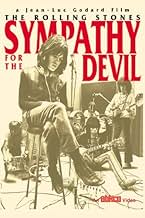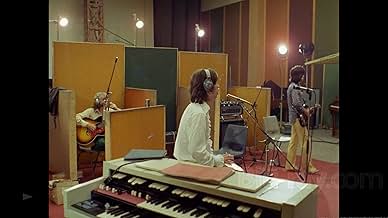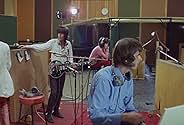IMDb RATING
6.2/10
3.5K
YOUR RATING
While The Rolling Stones rehearse "Sympathy for the Devil" in the studio, Godard reflects on 1968 society, politics and culture through five different vignettes.While The Rolling Stones rehearse "Sympathy for the Devil" in the studio, Godard reflects on 1968 society, politics and culture through five different vignettes.While The Rolling Stones rehearse "Sympathy for the Devil" in the studio, Godard reflects on 1968 society, politics and culture through five different vignettes.
- Director
- Writers
- Stars
Sean Lynch
- Commentary
- (voice)
Keith Richards
- Self - The Rolling Stones
- (as Keith Richard)
Frankie Dymon
- Black power militant
- (as Frankie Dymon Jnr.)
Tommy Ansah
- Black power militant
- (as Tommy Ansar)
- Director
- Writers
- All cast & crew
- Production, box office & more at IMDbPro
Featured reviews
Jean Luc Goddard's 'Sympathy For The Devil',or as it's known better in Europe as 'One Plus One' is an enigma (of sorts). The film's European title seems to better sum it all up. When Goddard went to England in 1968, he originally wanted to direct a film with a pro abortion angle, at a time when abortion was illegal. As it turns out, before production could begin,abortion became legal in the U.K. Goddard, none the less, decided to hang out & make a film anyway. He ended up as a guest of the Rolling Stones,where he filmed several days of the Stones in the recording studio,working on the sessions for the song 'Sympathy For The Devil', this footage was augmented with Godard's take on revolutionary politics of the era. The results are a mixed bag that some folk will get, others not so. I attended a midnight screening of this film some years ago with a crowd that expected a Rolling Stones concert film, and didn't get it, got downright ugly (a pity,but predictable for those who lack any knowledge of Godard's fragmentary style of narrative). No rating,but contains rough language,brief nudity & verbal descriptions of some graphic sexual situations.
This film is for true Rolling Stones or Godard fans only. If you are neither of the above you will probably have trouble sitting through the whole movie. Godard's political ramble becomes tedious at times, but watching the development of the Stones' song is priceless. Seeing the song come together as a blistering whirlwind is reward enough for repressing the urge to fast-forward through the rest of the film.
Sympathy for the Devil (1968)
BOMB (out of 4)
Jean-Luc Godard's "documentary" shows The Rolling Stones recording the title track while mixing in footage of the Black Panthers preaching hatred. This is without question one of the worst documentaries I've ever seen and it's the worth Godard film I've seen to date but it's rather amazing how incredibly stupid this legendary director can be at times. The title is going to attract mainly fans of The Rolling Stones but their footage isn't here for fans and I'm still trying to think of why Godard put the footage here. Apparently he's director's cut run eleven minutes longer and features more of the Black Panthers and it's clear that he wanted the spotlight on hate instead of the band so why include the band at all? There's one scene where a couple Black Panthers tell a story of how they want to kill white women and Godard follows this up with a short film of black men gunning down white women. There's non-stop hatred talk coming from this group so I'm really shocked there's not more controversy surrounding this film. There are various short films throughout the movie and there's all sorts of stuff acted out, which makes no sense when put together and you also get constant scenes of men spray painting cars. The Stones footage shows them recording the classic song from the early stages to its complete version but with all the other crap in this film I can't even recommend this to fans of the group.
BOMB (out of 4)
Jean-Luc Godard's "documentary" shows The Rolling Stones recording the title track while mixing in footage of the Black Panthers preaching hatred. This is without question one of the worst documentaries I've ever seen and it's the worth Godard film I've seen to date but it's rather amazing how incredibly stupid this legendary director can be at times. The title is going to attract mainly fans of The Rolling Stones but their footage isn't here for fans and I'm still trying to think of why Godard put the footage here. Apparently he's director's cut run eleven minutes longer and features more of the Black Panthers and it's clear that he wanted the spotlight on hate instead of the band so why include the band at all? There's one scene where a couple Black Panthers tell a story of how they want to kill white women and Godard follows this up with a short film of black men gunning down white women. There's non-stop hatred talk coming from this group so I'm really shocked there's not more controversy surrounding this film. There are various short films throughout the movie and there's all sorts of stuff acted out, which makes no sense when put together and you also get constant scenes of men spray painting cars. The Stones footage shows them recording the classic song from the early stages to its complete version but with all the other crap in this film I can't even recommend this to fans of the group.
ABKCO, not exactly a cultural or artistic enterprise obtained the rights to Godard's original film & cut titled 'One Pus One' , as well a large part of the Stones song catalog in a management dispute & subsequent separation between the two.
The 'Sympathy' release is significantly different than the original 'One Plus One', with much of the Stones studio material edited out for reasons unknown.
Huge clips of the development of the song have simply vanished, while the political scenes, rhetoric and narration remain intact.
What a shame, as I doubt very much we will ever see the 'One Plus One' Godard cut anywhere, ever.
The 'Sympathy' release is significantly different than the original 'One Plus One', with much of the Stones studio material edited out for reasons unknown.
Huge clips of the development of the song have simply vanished, while the political scenes, rhetoric and narration remain intact.
What a shame, as I doubt very much we will ever see the 'One Plus One' Godard cut anywhere, ever.
To save you time, I'll make some broad generalizations up front. Further down I'll get more into the guts of this film, but if you're just trying to decide if this movie is worth 2hrs of your life, here's what you need to know:
If you're a hardcore Stones fan, then this film will possibly irritate you, maybe even to the point of rioting as Stones fans reportedly did at the premiere of this film in '68. This is not a documentary about the Stones nor is it a documentary at all. It's a film that Godard had been intending to make about counter-culture revolution, and it just happened to coincide with Godard filming the Stones recording "Sympathy for the Devil", so he mashed them together and this is the result.
If you're a Godard fan, you might appreciate what he tried to accomplish here, but all the same, I've never met a Godard fan who considers this among his better efforts.
With a visionary filmmaker like Godard and a very poetic & provocative song like "Sympathy for the Devil", you'd think the marriage of the two would spawn a work of art the likes of which hadn't been seen since Pink Floyd's "The Wall". (Yeah I know The Wall came out in 1982 but bear with me, I'm onna roll).
Instead I feel like the two themes didn't exactly gel. Godard took a markedly different approach which, on its own, could have been a worthy film. Rather than follow the Stones' lead with an intriguing historical narrative that leads us from Biblical times to the assassination of JFK, Godard just throws a bunch of unrelated vignettes full of superfluous political blather (intended to be tiresome) interspersed with Stones recording the song, and we are to accept that they are somehow related?
While both the song & the film make heavy use of irony & sarcasm, and while both the song & the film are about the decline of human society due to human nature ("the devil"), the Stones & Godard are on different ends of the spectrum. What makes the Stones song so memorable is its suave, seductive flair told in 1st person narrative. In the very first line, Mick introduces the devil (the speaker) as "a man of wealth and taste". Essentially, this presents a very revolutionary concept of the devil: not an, ugly, smelly, cartoonish creature with a pitchfork but a charming, hypnotizing, classy character.
It would have been great if the film had followed along this absolutely central theme, but instead it took a very base, unattractive approach that was not enticing at all. There are no classy gents playing the devil here, instead we get the Black Panthers in a squalid junkyard spouting NOT hypnotic words but pulpy rhetoric which we immediately dismiss as pointless ravings as they casually commit base murder before our eyes.
In another example, Godard sets up a comical slapstick scene in a comic book store that also sells porn & Nazi propaganda, where the customers are allowed to take what they want in exchange for a "heil Hitler" and a slap across the face of two kidnapped hippies. I thought that was a hilarious scene, but really it was jarringly incongruous with the Stones song.
Between the half dozen vignettes like the Black Panther scene & the comic book scene & scenes of someone spray painting graffiti slogans across London, we get abruptly shifted back to the studio sessions where the Stones are working out the details of their song. In contrast with the vignettes, the studio scenes are very somber, very respectful and very endearing to watch. I found myself wishing that someone actually *would* make a documentary about the "Sympathy" sessions because so much could have been expounded on. We see the slow evolution of the initial song (a gospel type ballad) to what it ultimately became, an ironically uptempo samba that draws its power from a seductive Afro-Brazilian candomblé beat. Again I'm harping on the seductiveness of the song, both lyrically and instrumentally, because it's a real shame that Godard either didn't pick up on that, or chose to go in the opposite direction with a (deliberately) unappealing visual show.
Like I said, Godard's film would have been worthy on its own. The Stones song is, of course, a great piece of literature in its own right. But sticking them both together like this just didn't stick. I'm glad I saw this film, and I'll probably watch it again. But I wouldn't recommend it to anyone unless they're ready for a very strange and jarring experience.
For a great marriage of movie & music, I would recommend the aforementioned "Pink Floyd The Wall" as well as "Tommy", a sarcastic, carnival-esque satire much like Godard's approach here but with the perfect music in the same vein, and maybe the Monkees movie "Head" which is a nearly-incomprehensible acid trip but with similarly nearly-incomprehensible lyrics that gel perfectly.
If you're a hardcore Stones fan, then this film will possibly irritate you, maybe even to the point of rioting as Stones fans reportedly did at the premiere of this film in '68. This is not a documentary about the Stones nor is it a documentary at all. It's a film that Godard had been intending to make about counter-culture revolution, and it just happened to coincide with Godard filming the Stones recording "Sympathy for the Devil", so he mashed them together and this is the result.
If you're a Godard fan, you might appreciate what he tried to accomplish here, but all the same, I've never met a Godard fan who considers this among his better efforts.
With a visionary filmmaker like Godard and a very poetic & provocative song like "Sympathy for the Devil", you'd think the marriage of the two would spawn a work of art the likes of which hadn't been seen since Pink Floyd's "The Wall". (Yeah I know The Wall came out in 1982 but bear with me, I'm onna roll).
Instead I feel like the two themes didn't exactly gel. Godard took a markedly different approach which, on its own, could have been a worthy film. Rather than follow the Stones' lead with an intriguing historical narrative that leads us from Biblical times to the assassination of JFK, Godard just throws a bunch of unrelated vignettes full of superfluous political blather (intended to be tiresome) interspersed with Stones recording the song, and we are to accept that they are somehow related?
While both the song & the film make heavy use of irony & sarcasm, and while both the song & the film are about the decline of human society due to human nature ("the devil"), the Stones & Godard are on different ends of the spectrum. What makes the Stones song so memorable is its suave, seductive flair told in 1st person narrative. In the very first line, Mick introduces the devil (the speaker) as "a man of wealth and taste". Essentially, this presents a very revolutionary concept of the devil: not an, ugly, smelly, cartoonish creature with a pitchfork but a charming, hypnotizing, classy character.
It would have been great if the film had followed along this absolutely central theme, but instead it took a very base, unattractive approach that was not enticing at all. There are no classy gents playing the devil here, instead we get the Black Panthers in a squalid junkyard spouting NOT hypnotic words but pulpy rhetoric which we immediately dismiss as pointless ravings as they casually commit base murder before our eyes.
In another example, Godard sets up a comical slapstick scene in a comic book store that also sells porn & Nazi propaganda, where the customers are allowed to take what they want in exchange for a "heil Hitler" and a slap across the face of two kidnapped hippies. I thought that was a hilarious scene, but really it was jarringly incongruous with the Stones song.
Between the half dozen vignettes like the Black Panther scene & the comic book scene & scenes of someone spray painting graffiti slogans across London, we get abruptly shifted back to the studio sessions where the Stones are working out the details of their song. In contrast with the vignettes, the studio scenes are very somber, very respectful and very endearing to watch. I found myself wishing that someone actually *would* make a documentary about the "Sympathy" sessions because so much could have been expounded on. We see the slow evolution of the initial song (a gospel type ballad) to what it ultimately became, an ironically uptempo samba that draws its power from a seductive Afro-Brazilian candomblé beat. Again I'm harping on the seductiveness of the song, both lyrically and instrumentally, because it's a real shame that Godard either didn't pick up on that, or chose to go in the opposite direction with a (deliberately) unappealing visual show.
Like I said, Godard's film would have been worthy on its own. The Stones song is, of course, a great piece of literature in its own right. But sticking them both together like this just didn't stick. I'm glad I saw this film, and I'll probably watch it again. But I wouldn't recommend it to anyone unless they're ready for a very strange and jarring experience.
For a great marriage of movie & music, I would recommend the aforementioned "Pink Floyd The Wall" as well as "Tommy", a sarcastic, carnival-esque satire much like Godard's approach here but with the perfect music in the same vein, and maybe the Monkees movie "Head" which is a nearly-incomprehensible acid trip but with similarly nearly-incomprehensible lyrics that gel perfectly.
Did you know
- TriviaThe producer of the film added film of The Rolling Stones performing the completed version of "Sympathy for the Devil" at the end of the movie in an attempt to make it more commercial. Jean-Luc Godard was so incensed by this that he punched the producer during a talk at London's National Film Theatre.
- Alternate versionsJean-Luc Godard's original director's cut (titled "One Plus One") runs approximately 110 minutes and consists largely of additional footage of the black power militants. The film's producers were dissatisfied with this cut and deleted 11 minutes, changed the title to "Sympathy for the Devil" to underscore the Stones connection, and added the final version of the title song to the film's soundtrack, over a freeze-frame of the last shot. These changes were all made without Godard's knowledge; when he finally saw them at the film's London Film Festival premiere, he allgedly went berserk and physically attacked one of the producers.
- ConnectionsEdited into Histoire(s) du cinéma: Une vague nouvelle (1999)
Details
- Release date
- Countries of origin
- Official site
- Language
- Also known as
- The Rolling Stones: Sympathy for the Devil
- Filming locations
- Battersea Railway Bridge, Battersea, London, England, UK(car wreck by the Thames)
- Production companies
- See more company credits at IMDbPro
Box office
- Budget
- $1,000,000 (estimated)
Contribute to this page
Suggest an edit or add missing content


































